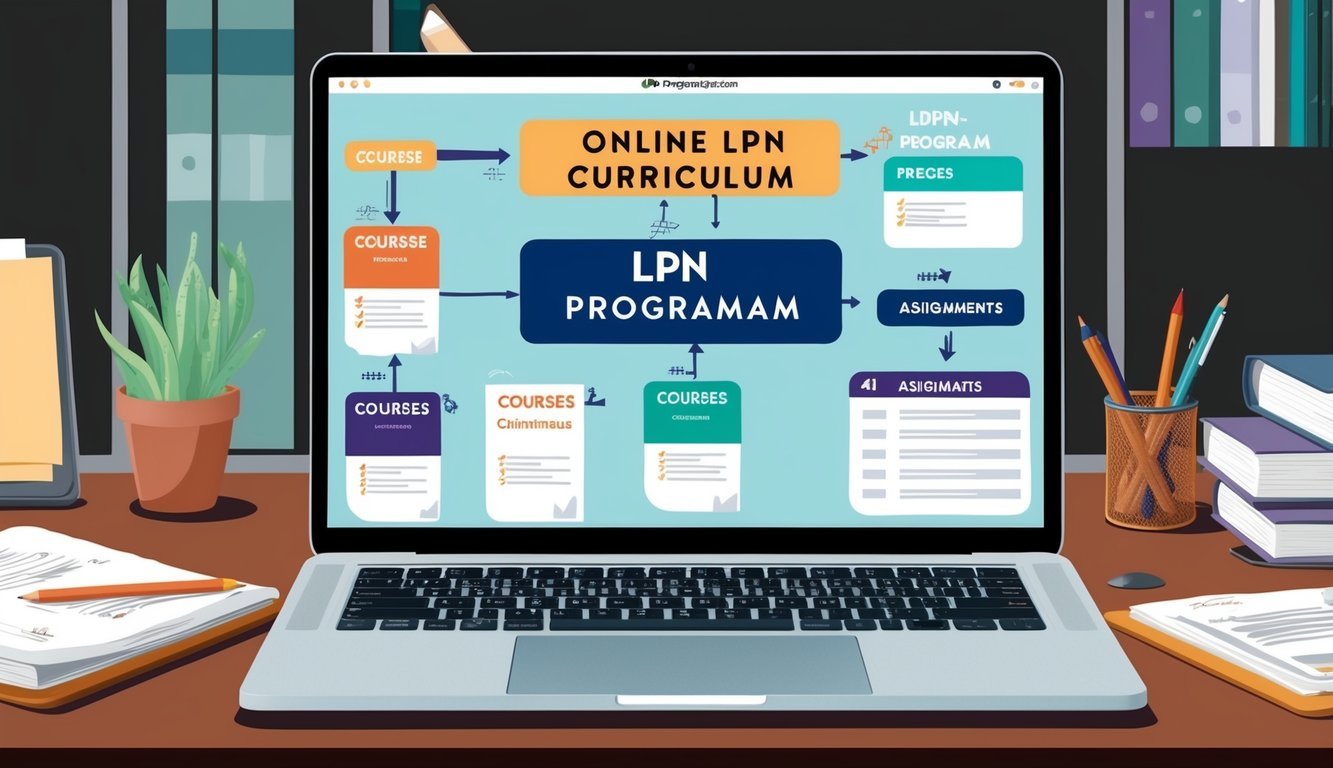The demand for healthcare professionals continues to rise.
Pursuing a career as a Licensed Practical Nurse (LPN) offers a pathway to a rewarding profession.
Enrolling in LPN programs online provides you with the flexibility to balance your education with existing commitments.
This allows you to advance your nursing education from the comfort of your home.
Many accredited online programs offer comprehensive curriculums that cover essential nursing principles, preparing you for a successful career in nursing.
With online learning, you can engage with interactive course materials, access virtual classrooms, and participate in discussions with peers and instructors.
Many programs combine theoretical knowledge with in-person clinical training, ensuring you gain both the critical thinking and hands-on skills required in the field. You can find a range of options that fit your schedule and learning preferences while still providing the necessary qualifications to become an LPN.
Choosing the right program involves researching various schools and understanding their accreditation, costs, and curriculum offerings.
You can streamline your search by reviewing resources that compare top online LPN programs, helping you make an informed decision.
By exploring these educational opportunities, you can take the first step towards a fulfilling career in nursing.
Exploring Online LPN Programs
Online LPN programs offer flexible and convenient options for aspiring nurses.
They combine the essential theoretical knowledge and clinical skills required for practical nursing, making it easier for you to balance education with personal and professional commitments.
Benefits of Online Learning for LPN Training
One of the main advantages of online LPN programs is flexibility.
You can study at your own pace and on your own schedule, accommodating work or family responsibilities.
Many programs incorporate a hybrid model, allowing you to complete theory courses online while engaging in required clinical experiences at local healthcare facilities.
Additionally, online programs often provide a wider range of options.
You can access programs from institutions across the country, enabling you to choose the best fit for your educational and career goals.
Cost-effectiveness is another benefit, as online programs frequently have lower tuition rates compared to traditional schools.
Comparing Online LPN Programs to Traditional Programs
When comparing online LPN programs to traditional ones, consider both academic quality and learning style.
Online programs typically offer a mix of asynchronous and synchronous courses, allowing you to learn at your own pace while still participating in live discussions.
In contrast, traditional programs require in-person attendance, which might limit your flexibility.
However, in-person programs often provide immediate access to instructors and classmates, facilitating networking and support.
It’s essential to evaluate your learning preferences and life circumstances when choosing between these formats.
| Aspect | Online LPN Programs | Traditional Programs |
|---|---|---|
| Flexibility | High | Low |
| Learning Environment | Online, hybrid options available | In-person |
| Networking Opportunities | Virtual or occasional local clinical placements | Direct access to peers and instructors |
| Cost | Often lower tuition rates | Generally higher tuition fees |
Understanding Accreditation for Online Nursing Programs
Accreditation is crucial when selecting an online LPN program.
Attending an accredited school ensures that the program meets established academic quality standards.
Accreditation can impact your ability to apply for financial aid and obtain licensure after graduation.
You should look for programs accredited by recognized organizations such as the Accreditation Commission for Education in Nursing (ACEN) or the Commission on Collegiate Nursing Education (CCNE).
These endorsements indicate that the program provides a quality education that prepares you for the NCLEX-PN exam and a successful nursing career.
Before enrolling, verify the program’s accreditation status through its website or contact the admissions office for details.
This step is essential to ensure your investment in education leads to valuable credentials in the nursing field.
Admission Requirements and Application Process
Understanding the admission requirements and application process for online LPN programs is crucial for your success.
Each program may have specific criteria, but there are common elements you can anticipate.
Preparation for the NCLEX-PN exam is also a critical component of your journey towards becoming a Licensed Practical Nurse (LPN).
Essential LPN Program Admission Criteria
To apply for an online LPN program, you’ll typically need to meet several key criteria:
- Education: A high school diploma or equivalent is required. Some programs may ask for transcripts showing a minimum GPA, often around 2.5.
- Entrance Exams: Many programs require you to take the ATI-TEAS entrance exam, assessing your readiness for nursing coursework.
- Background Check: You may need to undergo a criminal background check as part of your application process.
- Letters of Recommendation: Some schools request letters from teachers or employers demonstrating your capability and commitment.
Confirm these requirements with your chosen program, as they can vary.
Navigating the Application Process for Online LPN Programs
The application process generally involves the following steps:
- Research Programs: Investigate various online LPN programs to find one that fits your needs.
- Submit Applications: Complete the online application for your selected programs, ensuring you provide all required documents.
- Entrance Exam: Schedule and take the required entrance exams, such as the ATI-TEAS.
- Interviews: Some programs may conduct interviews to assess your motivation and fit for the nursing field.
Make sure to keep track of deadlines and requirements to avoid missing out on your desired program.
Preparing for the NCLEX-PN Exam
Once you complete your LPN program, you must prepare for the NCLEX-PN exam to become licensed:
- Study Materials: Utilize review books, online courses, and practice exams to help you prepare.
- Study Plan: Create a structured study plan to cover all exam topics effectively.
- Practice Questions: Consistently practice with sample questions and tests to familiarize yourself with the exam format.
Focus on achieving a high NCLEX pass rate, as successful completion is essential for pursuing your career as a Licensed Practical Nurse.
Curriculum and Coursework

The curriculum for online LPN programs is designed to provide a solid foundation in both nursing theory and practical skills.
You’ll engage in various subjects that prepare you for diverse patient care scenarios.
The coursework emphasizes critical nursing principles and provides extensive clinical experiences essential for your future practice.
Core Nursing Theory and Practical Skills
Your program will include core nursing theory, which covers essential subjects such as anatomy, physiology, and pharmacology.
Understanding these foundational elements is crucial for effective patient care.
Practical skills training involves hands-on techniques that you will need in various clinical settings.
This can include:
- Basic nursing skills (e.g., taking vitals, wound care)
- Patient assessment techniques
- Communication strategies for patient interaction
Each aspect of the curriculum ensures that you develop both the theoretical knowledge and practical skills necessary for nursing competency.
You’ll explore the intricacies of nursing theory to handle complex clinical situations effectively.
Clinical Experience in LPN Programs
A significant component of your online LPN program will be the clinical hours required for certification.
You will typically need to complete a set number of hours in clinical practice settings, ranging from healthcare facilities to community clinics.
These clinical experiences offer direct exposure to:
- Patient care procedures
- Team collaboration with healthcare professionals
- Application of nursing skills in real-world situations
During this phase, you will hone your skills in a structured environment while applying your learning from the coursework.
It’s crucial for your development as a proficient nurse.
Specialized Courses for Comprehensive Care
In addition to core courses, many programs offer specialized classes that address specific areas of nursing practice.
These can include:
- Pediatric nursing
- Geriatric care
- Mental health nursing
These specialized courses equip you with knowledge needed to address diverse patient populations.
They provide deeper insights into unique health challenges, ensuring you can deliver comprehensive care across various settings.
By completing these specialized courses, you enhance your knowledge and skill set, preparing you for various roles within the nursing field.
Clinical Training and Practical Experience

Clinical training is essential for your development as a Licensed Practical Nurse (LPN).
It ensures you acquire the necessary skills in patient care through hands-on experience.
The following key areas are crucial for your successful transition from online learning to effective clinical practice.
Securing Clinical Rotations and Healthcare Facilities
When pursuing an online LPN program, securing clinical rotations is a vital step.
These rotations typically happen in healthcare facilities like hospitals, nursing homes, or outpatient clinics.
To find suitable placements, you should actively communicate with your program’s clinical coordinator.
They often have established relationships with local healthcare facilities.
Make sure to identify facilities that align with your career interests, whether it’s pediatrics, geriatrics, or acute care. Proactive networking can significantly enhance your chances of obtaining a coveted clinical spot.
Transitioning from Online Classes to In-Person Clinical Training
Transitioning from online classes to in-person training can be challenging but rewarding.
You will need to adapt quickly to the fast-paced clinical environment.
During this time, it’s crucial to maintain open communication with your instructors and peers.
Engaging in discussions about your experiences can provide valuable insights.
Familiarize yourself with clinical workflows and protocols before starting.
Understanding the expectations of healthcare teams will aid in blending your theoretical knowledge with practical skills.
Be prepared to demonstrate your competencies in patient care and teamwork.
Gaining Real-World Nursing Experience
Gaining real-world nursing experience is fundamental to your training.
Clinical rotations allow you to apply classroom knowledge to actual patient care situations.
Focus on key elements such as:
- Patient Assessment: Learn to conduct thorough assessments.
- Medication Administration: Understand protocols for safe and effective medication delivery.
- Communication Skills: Develop your ability to interact with patients and the healthcare team effectively.
Participating in diverse clinical settings will enrich your understanding of different patient needs and care models.
Take the opportunity to ask questions and seek feedback during your rotations.
This hands-on experience will shape your nursing practice and prepare you for your future career.
Career Outcomes and Advancement
Pursuing a career as a Licensed Practical Nurse (LPN) opens the door to various job opportunities and advancement pathways.
Understanding potential career trajectories and the educational options available can significantly impact your professional growth.
The following sections provide insights into job potential, continuing education, and the employment landscape for LPNs.
Job Opportunities for LPNs and Career Growth
As an LPN, you can work in diverse healthcare settings, including nursing homes, hospitals, and clinics.
The Bureau of Labor Statistics projects that LPN employment will grow by 9% from 2020 to 2030, which is faster than the average for all occupations.
Potential Job Settings:
| Setting | Description |
|---|---|
| Nursing Homes | Provide long-term care to patients. |
| Hospitals | Assist in various departments, including surgery and pediatrics. |
| Clinics | Offer outpatient care and health education. |
Your median annual salary can vary based on experience, location, and work setting.
The median salary for LPNs was approximately $48,000 per year, with top earners making around $63,000.
In addition, many employers offer benefits, which can enhance your overall compensation.
Continuing Education: From LPN to RN and Beyond
Transitioning from LPN to RN can significantly enhance your career.
Programs like the LPN to RN and LPN to BSN facilitate this advancement, focusing on expanding your clinical skills and responsibilities.
These pathways can be completed through hybrid or online formats, allowing you to balance work and study.
Many employers may offer tuition reimbursement, making this a financially viable option.
The average program length varies, but many can be completed in 12 to 24 months.
Graduates tend to enjoy higher earning potential and more job responsibilities.
Understanding the Employment Landscape for LPNs
The aging population and the increasing need for healthcare services largely influence the demand for LPNs.
According to the Bureau of Labor Statistics, LPNs play a crucial role in patient care.
They often serve as the first contact between patients and healthcare professionals.
Increasing your skills and education can improve your job stability and retention rates in the nursing field.
Networking with healthcare professionals and joining organizations can further enhance your career opportunities.
Being aware of these dynamics can better prepare you for a successful career as an LPN.
It can also guide you in making informed decisions about your professional path.

